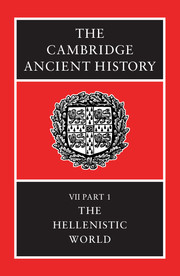Book contents
- Frontmatter
- 1 Sources for the period
- 2 The succession to Alexander
- 3 Monarchies and monarchic Ideas
- 4 The formation of the Hellenistic kingdoms
- 5 Ptolemaic Egypt
- 6 Syria and the East
- 7 Macedonia and Greece
- 8 Cultural, social and economic features of the Hellenistic world
- 9 Hellenistic science: its application in peace and war
- 10 Agathocles
- 11 The Syrian-Egyptian Wars and the new lingdoms of Asia Minor
- 12 Macedonia and the Greek leagues
- BIBLIOGRAPHY
- Index
- Map 3. Egypt.
- Map 4. Hellenistic Asia.
- Map 5. The Greek mainland and the Aegean.
- References
3 - Monarchies and monarchic Ideas
Published online by Cambridge University Press: 28 March 2008
- Frontmatter
- 1 Sources for the period
- 2 The succession to Alexander
- 3 Monarchies and monarchic Ideas
- 4 The formation of the Hellenistic kingdoms
- 5 Ptolemaic Egypt
- 6 Syria and the East
- 7 Macedonia and Greece
- 8 Cultural, social and economic features of the Hellenistic world
- 9 Hellenistic science: its application in peace and war
- 10 Agathocles
- 11 The Syrian-Egyptian Wars and the new lingdoms of Asia Minor
- 12 Macedonia and the Greek leagues
- BIBLIOGRAPHY
- Index
- Map 3. Egypt.
- Map 4. Hellenistic Asia.
- Map 5. The Greek mainland and the Aegean.
- References
Summary
THE NEW POLITICAL PATTERN
Within twenty years of Alexander's death his empire had split into separate states, whose rulers had taken the title of king. In future most Greeks were to live under the shadow of monarchic régimes. Some lived in cities situated within the kingdoms, and even the inhabitants of mainland Greece and such islands as stayed independent were subjected to their pressure, while many from time to time were forced to endure their garrisons. The immediate presence of monarchy affected all aspects of life, including political theory and philosophical speculation. It was the exceptional city that could escape making some sort of accommodation with one or other of the new monarchies and political theory now had to start from the premise that kingship was the best form of state. This was an assumption not too difficult to accept in as much as it was far from novel. Throughout the fourth century a strong current of antidemocratic thought had advocated monarchy as the most stable régime and the one best able to defend the power and prosperity of the rich. According to Aristotle (Pol. VII (v).10.3, 1310b 9ff.), kingship is the resource of the better classes against the people, whereas a tyrant is chosen from the people to be their protector against the notables. Such notions fell in with the new political developments which followed after Alexander; but they were not their cause, for the monarchic régimes had sprung naturally out of the break-up of Alexander's empire, left without an effective heir.
Keywords
- Type
- Chapter
- Information
- The Cambridge Ancient History , pp. 62 - 100Publisher: Cambridge University PressPrint publication year: 1984
References
- 31
- Cited by

